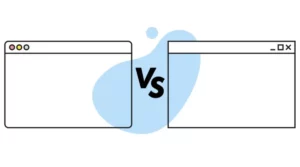When choosing a computer for programming, it is important to consider the amount of storage needed in order to be able to save all your projects. Depending on the type of programmer you are and the additional tasks you perform, you might need different amounts of storage.
As a general rule, 256 GB of storage is the minimum recommended for programming. For game developers, at least 500 GB might be required as these types of programmers usually work with heavy development environments and large files.
In this article, we will discuss the amount of storage recommended for programming in more detail.
How many GB does a programmer need?
When determining how many GB a programmer needs, we need to consider all the elements that go in a developer’s environment. These are the following:
- An Operating System
- A Code Editor or/and an Integrated Development Environment (IDE)
- A Virtual Machine
- A Web Browser
- Total project files size
In the case of the Operating System, around 15-20 GB have to be allocated for system and configuration files. This is true for the most popular Operating Systems like Windows and Mac OS.
For Integrated Development Environments (IDEs), the required space changes depending on the programming language and the specific environment used. These environments can take a considerable amount of space. You can look at the following table to have an idea of the recommended space for the most popular IDEs.
| IDE | Required Space |
|---|---|
| Visual Studio | Can be up to 210 GB Typically 20-50 GB |
| Android Studio | At least 4 GB |
| Unity Game Engine | Typically 15-20 GB |
| PyCharm | At least 5 GB |
| Eclipse | At least 5 GB |
| WebStorm | At least 5 GB |
Most IDEs can take around 5 GB of storage. However, Unity Game Engine and Visual Studio take more space. In addition, we have to consider that some programmers might need to use different programming languages at the same time, and would need to install two or more of these types of software packages. We can consider 20 GB to be a good approximation of the space required for IDEs for most programmers.
In the case of Unity game developers, you might have to install both Unity Game Engine and Visual Studio. This means that we would need to allocate around 40-70 GB only for IDEs.
To reduce the storage required by IDEs, you can consider code editors. These tools are lighter alternatives to IDEs because they take just a fraction of space. However, code editors have very limited functionality as they don’t have the same features as IDEs. The following table shows the amount of space required by some common code editors. We can see that code editors don’t require much storage.
| Code editor | Required space |
|---|---|
| Notepad ++ | 180 MB |
| VS Code | 200 MB |
| Atom | 180 MB |
| Sublime Text | 200 MB |
Some programmers might also need to run Virtual Machines. Virtual Machines are used when it is necessary to test different configurations and setups. With Virtual Machines, programmers can try different scenarios and identify any configuration problems. These tools can be quite heavy, for example, an Ubuntu VM takes 2.3 GB of space. If we consider around 5 GB for data storage, we would need at least 7 GB to run a Virtual Machine.
For web developers, they might need to install two or more browsers to create and test their projects. However, these are light applications, and the most popular browsers like Chrome, Firefox, Safari can take 200 MB to 1 GB. We can approximate the space for web browsers to 2 GB.
Storage required for project files
The space required for project files depends on the type of project. For example, for web or mobile app developers, a project with high-quality images can take up to 500 MB. For a small project with very few images, it shouldn’t take more than 200 MB.
However, for video game programmers, the space required can be much higher given that there is a large number of graphics and sound files related to these projects. In small projects, a video game can take around 1 GB. On the other hand, large projects can take 50-100 GB or even more.
Considering all the different elements we have discussed so far, we can form a table with the amount of storage recommended for the different types of programmers:
| Type of programmer | Storage requirement |
|---|---|
| Web developer | At least 120 GB 256 GB recommended |
| Software developer | At least 120 GB 256 GB recommended |
| Application developer | At least 120 GB 256 GB recommended |
| Game developer | 500 GB recommended |
Storage required for additional tasks
In addition to the storage required by the different elements that go into programming projects, we also have to consider any additional tasks that you might perform on your computer. For example, if you also use your computer to save personal photos or for gaming, you might need additional storage.
In the following table, you can look at the required storage for various additional tasks.
| Task | Storage required |
|---|---|
| 16 MP picture | 4.8 MB |
| 1-minute video at 1080p | 20 MB |
| 1-minute video at 4K | 84 MB |
| Adobe Photoshop | 10 GB recommended |
| Office 365 | 3 GB |
| GTA 5 | 65 GB |
HDD or SSD for programming?
After determining the amount of storage recommended by different types of programmers, we also have to consider the type of storage. Depending on your needs, an HDD or an SSD will work best for you.
The hard drive disk (HDD) is a mechanical type of drive. This drive consists of a spinning disc that has actuators and a head to read and write data. HDDs are an older type of hardware and are cheaper when compared to SSDs. However, the disadvantage of these drives is their slower read and write speeds due to their mechanical parts.
The solid-state drive (SSD) is a drive that uses integrated circuits to store data. Given that these drives don’t have moving parts, they have higher read and write speeds. SSDs are a newer type of hardware and are more expensive than HDDs.
SSDs are recommended for programmers who are concerned with performance and want the fastest hardware to run their projects smoothly. Using SSDs means much faster performance, which in turn allows for faster app load times.
On the other hand, if you need to get the most storage at the cheapest cost possible, then opt for an HDD as these drives are cheaper than SSD. However, consider that you will be compromising some performance.
Boost Your Business
Want more clients and sales? Our web development services will optimize your website to convert more visitors into customers.
Get Started TodayHow to determine the amount of storage needed for programming?
Considering everything we have discussed, we can formulate the following concrete tips to choose the type and amount of storage for programmers.
Tips for choosing amount of storage
- Depending on the type of programmer you are, we can have a general idea of the amount of GB required. Web and application developers should get 256 GB of storage. For gaming developers, the recommended storage is 500 GB.
- Consider any additional files not related to programming. For example, if you are a web developer, but also plan on using your computer to store personal photos or videos and for gramming, you should consider getting a computer with at least 500 GB.
- If you want to optmize for performance, opt for an SSD.
- If your budget is lower, opt for an HDD.
Boost Your Business
Want more clients and sales? Our web development services will optimize your website to convert more visitors into customers.
Get Started Today







